#big data visualisation
Explore tagged Tumblr posts
Text

Data Cubed Ltd
Speak to a data expert for becoming data-driven and make more money. Get started with your data opportunities and challenges today, it’s easier than you think.We can set up data warehouses, data lakes, dashboards, or more sophisticated tools powered by AI, predictive analytics, machine learning and natural language processing.
#automated dashboards#big data visualisation#business data#business data analysis#business data help#business intelligence and business analytics.
0 notes
Text
How Data Visualization Improves Communication Across Stakeholders? A Game-Changer for Businesses | PiLog Group
Inthe age of information overload, effective communication between stakeholders can make or break a project. One of the most powerful tools in improving this communication is data visualization.
When data is presented visually, it’s not just easier to understand — it becomes a language that transcends barriers, providing clarity, insights, and alignment among teams, decision-makers, and clients.
To dive deeper into how data visualization can improve communication, check out this insightful video:
youtube
The Power of Data Visualization in Stakeholder Communication
Data visualization serves as the bridge between complex data and clear communication. By transforming raw data into digestible visual formats such as charts, graphs, and infographics, organizations can engage their stakeholders with information that’s both insightful and accessible. Here’s how data visualization works wonders:
1. Simplifies Complex Data
Complex data sets can overwhelm stakeholders, especially those not familiar with raw numbers. Data visualization simplifies intricate patterns and trends, making them easier to grasp at a glance.
2. Enhances Decision-Making
With clear visuals, stakeholders can make informed decisions quickly. By highlighting key trends and correlations, it accelerates decision-making processes.
3. Facilitates Better Collaboration
Visualized data fosters collaboration by providing a common ground for discussion. Whether through interactive dashboards or presentation-ready reports, data visualization helps all stakeholders understand and contribute effectively.
4. Increases Transparency and Accountability
Data visualization ensures that stakeholders at all levels are on the same page. It holds teams accountable by providing a clear view of performance metrics, goals, and achievements.
The Role of Data Storytelling in Communication
Storytelling with data is another powerful strategy that combines narrative and data visualization. It’s about weaving a story around the data, guiding stakeholders through the numbers in a way that makes them engaging and memorable.
By integrating storytelling techniques, businesses can connect emotionally with their audience and make the data not just informative, but compelling.
Want to learn more about data storytelling and how it enhances stakeholder communication? Watch the full video here
Data Visualization is Key to Effective Stakeholder Communication
In today’s fast-paced business world, effective communication between stakeholders is more important than ever. With data visualization, organizations can bridge communication gaps, facilitate collaboration, and drive better business decisions.

Don’t miss out on how data visualization can transform your communication strategy. Watch the full video here
#data visualization#data storytelling#data communication#data visualisation#drimadsyed#piloggroup#youtube#big data#data scientist#data analytics#data governance#datadriven#dataengineering#data#data analysis#datamanagement#dataprivacy#dataprotection#Youtube
0 notes
Text
Industry-Leading Visualization with Tableau Data Visualization

1. User-Friendly Interface: The intuitive design allows anyone to easily start visualizing data.
2. Seamless Integration: Connects easily with various data sources for efficient analysis.
3. Quick Insights: Generate actionable insights within minutes.
4. Integrated Collaboration Tools: Share dashboards and insights with your team effortlessly.
5. Regular Updates: Tableau continuously evolves with new features and improvements.
Want to take your skills to the next level? Join our 1-day Tableau Bootcamp on 2nd November (Online)!
#tableau#tableau software#data visualization#data visualisation#dataviz#software#technology#cavillion#cavillion learning#data analytics#data#tableau online training#tableaudesktop#tableau dashboard#big data#business analytics#data analysis#data science#tableau course#salesforce#Tableau Tutorial#Tableau Visualization#Tableau Training#learn tableau#tableau certification#Tableau Visualisation
1 note
·
View note
Note
hi i was wondering if you would be able to answer this: what is the purpose of the fluo paint teams seem to add during testing? as well as what are the wire meshes they add behind the front wheels?
My favourite question
Let me introduce you to the world of F1 testing and its two shining stars, flow vis and aero rakes.
Flow Vis


Flow vis is a fluorescent powder paint that is mixed with oil (typically paraffin) and painted onto the car before it goes out on track.
Once the car goes out and does some laps the oily paint mixture is pushed around the car and the oil evaporates leaving the paint behind, and in this paint you will see the flow patterns of the air around the structures of the car
The engineers will be able to visualise where the airflow is separating and compare that to the data they have from the wind tunnel and to the data from their computer models.
Essentially flow vis allows them to visualise the air flow
Aero Rake



The big metal cages, usually around the front or rear wheels are called aero rakes or aerodynamic rakes, and what they are is a massive series of sensors namely pitot tubes which measure dynamic pressure.
These sensors measure the pressure of the airflow off the tyres, the wings and generally the pressure of the airflow around the car, in order to paint a picture of what is happening to the airflow and how they can minimise disturbance in the airflow
With both flow vis and aero rakes it’s a way for engineers and aerodynamicists to see what is actually going on with the airflow around the car on the track, both with visual cues (flow vis) and data (aero rakes) and then being able to compare their findings with the simulations
110 notes
·
View notes
Text
Hello. You might have seen this floating around on twt:


link 1 // link 2, archive link
If by any chance you or someone you know are thinking about joining in on the challenge… no one can stop you but I implore you as someone who makes art, as someone with friends in an often-exploited creative industry, as someone who lives in late stage capitalism alongside you and has seen this play out before: proceed with caution.
Read the fine print on that form. There is NO guarantee of an internship, much less a job at the end of it. I haven't gone further than this form, but if anyone reading this does, and if there's no written agreement that your work won't be used without credit to you + payment for services rendered - RUN.
This is a common corporate tactic to get free labor out of people. I'm not saying this is necessarily what’s happening; for all we know this was done as a completely innocent move to drum up some fan engagement and as a genuine search for talent for their analytics team. WHO KNOWS. But I can't ignore that I’ve seen this situation play out again and again, at every scale.
Job interviews, when they ask you how YOU think they should improve their systems, how YOU would solve their problems? When they require that you do some problem-solving for them, and it goes beyond a simple task? That’s a free consultation you’re giving them, that's free work you or someone else should be getting paid for.
When big streamers/influencers ask their fans to join in on a fan art contest to choose their new pfp/banner? That’s hundreds, possibly thousands of pieces of free art they never would’ve gotten otherwise. They could've gone to the trouble of paying someone in-house to do it, hiring someone for that position, commissioning a professional for a piece. It's free work from their dedicated fans.
In this case, Utah HC is asking fans to not only choose/provide their own dataset, but to do a complex analysis on it AND do the work of visual and verbal communication to senior management, who likely do not have a deeper grasp of the concepts and will need it simplified. The stipulation that you will present your work could be ANYTHING!! The "five page deliverable" is already bananas to me, having dipped my toe into what analytics is and how complex the fun ones are. Condensing it all is WORK. The presentation portion may include speaking time and answering questions; the groundwork for doing this effectively may include producing data visualisations, making spreadsheets, time consuming write-ups. Maths and science communication is hard. It is WORK. They are asking for free labor.
Many have already called it out, but it's still gaining traction via retweets from big accounts uncritically sharing it. I found out through the official Puckpedia account. Jack Han called it out pretty eloquently on twitter and on his substack:
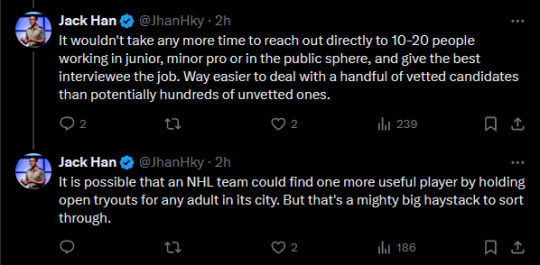
Many people aspire to work as an analyst in the NHL. Earlier today the Utah Hockey Club gave those people a glimmer of hope. Utah’s Summer Analytics Challenge is unusual in that it doesn’t provide a dataset or detailed instructions. The open-ended contests contrasts with other public (ex: Big Data Cup) or private (ex: NHL team interview) events. In those scenarios, participants are given proprietary data to clean, model and analyze, which influence direction and methodology. Meanwhile, Utah is seemingly happy with anything as long as the writeup is under five pages long. Utah’s contest also stands out in its near-total absence of legal fine print. There are no mention of intellectual property implications, which is perhaps fitting when the team is asking participants to bring their own data and analysis. [...] Open casting calls such as Utah’s analytics challenge start out as a lose-lose-lose proposition: > The employer loses because it will have to invest massive human resources to trawl/filter/evaluate/reverse-engineer the hundreds of write-ups it is sure to receive, with no guarantee that any of them will be of use > Applicants lose because the vast, vast majority of them will have nothing to show for their efforts, while a tiny minority risks having its IP stolen > Good ideas lose because they’ll be born into an environment where their parents (the applicant & the employer) have no defined relationship and won’t be in a position to grow together
link, archive link
I do try to keep things light on this blog, but this is super personal for me <3 thank u for listening
#so glad the majority of the reaction to this has been to shit on it tbqh. GET THEIR ASSES#TRYING OUT ADDING ARCHIVE LINKS WHEN I CAN !! FUCK WEBROT!!! AND FUCK THEM IF THEY TRY TO DELETE THE EVIDENCE!!!#Utah HC#Utah Hockey Club#puckposting
38 notes
·
View notes
Text

Deep in the Mediterranean, in search of quantum gravity
A study published in JCAP places new limits on quantum gravity using data from the underwater detector KM3NeT
Quantum gravity is the missing link between general relativity and quantum mechanics, the yet-to-be-discovered key to a unified theory capable of explaining both the infinitely large and the infinitely small. The solution to this puzzle might lie in the humble neutrino, an elementary particle with no electric charge and almost invisible, as it rarely interacts with matter, passing through everything on our planet without consequences.
For this very reason, neutrinos are difficult to detect. However, in rare cases, a neutrino can interact, for example, with water molecules at the bottom of the sea. The particles emitted in this interaction produce a “blue glow” known as Čerenkov radiation, detectable by instruments such as KM3NeT.
The KM3NeT (Kilometer Cube Neutrino Telescope) is a large underwater observatory designed to detect neutrinos through their interactions in water. It is divided into two detectors, one of which, ORCA (Oscillation Research with Cosmics in the Abyss), was used for this research. It is located off the coast of Toulon, France, at a depth of approximately 2,450 meters.
However, merely observing neutrinos is not enough to draw conclusions about the properties of quantum gravity—we must also look for signs of “decoherence”.
As they travel through space, neutrinos can “oscillate”, meaning they change identity—a phenomenon scientists refer to as flavor oscillations. Coherence is a fundamental property of these oscillations: a neutrino does not have a definite mass but exists as a quantum superposition of three different mass states. Coherence keeps this superposition well-defined, allowing the oscillations to occur regularly and predictably. However, quantum gravity effects could attenuate or even suppress these oscillations, a phenomenon known as “decoherence”.
“There are several theories of quantum gravity which somehow predict this effect because they say that the neutrino is not an isolated system. It can interact with the environment,” explains Nadja Lessing, a physicist at the Instituto de Física Corpuscular of the University of Valencia and corresponding author of this study, which includes contributions from hundreds of researchers worldwide.
“From the experimental point of view, we know the signal of this would be seeing neutrino oscillations suppressed.” This would happen because, during its journey to us—or more precisely, to the KM3NeT sensors at the bottom of the Mediterranean—the neutrino could interact with the environment in a way that alters or suppresses its oscillations.
However, in Lessing and colleagues’ study, the neutrinos analyzed by the KM3NeT/ORCA underwater detector showed no signs of decoherence, a result that provides valuable insights.
“This,” explains Nadja Lessing, “means that if quantum gravity alters neutrino oscillations, it does so with an intensity below the current sensitivity limits.” The study has established upper limits on the strength of this effect, which are now more stringent than those set by previous atmospheric neutrino experiments. It also provides indications for future research directions.
“Finding neutrino decoherence would be a big thing,” says Lessing. So far, no direct evidence of quantum gravity has ever been observed, which is why neutrino experiments are attracting increasing attention. “There has been a growing interest in this topic. People researching quantum gravity are just very interested in this because you probably couldn’t explain decoherence with something else.”
IMAGE: The visualisation of a simulated event in the KM3NeT/ORCA detector. Credit CC BY-NC 4.0 https://creativecommons.org/licences/by-nc/4.0 Credits KM3NeT
9 notes
·
View notes
Text
Little rant and brain dump post re: mental health + anxiety* under the cut bc this is one of my only safe spaces to do this (and I think it'll help to just go blaaaaahhhhh into this data ether.) * will try to tag for triggers but I keep seeing conflicting posts about how to do those sort of tags so I'm sorry if it's wrong
Normal programming will resume after this short break. Going to make that one the tag for all future brain dump posts I think.
This time next week I'll have made another big, scary step towards "getting better" (which is typed liked that because I hate that phrase) but I don't know how I'm going to cope or what I'm going to be like on the other side of it.
I'm hoping I'm just overthinking (as usual) but what if it kinda breaks me? I don't think it would; nothing so far has, so why would this be different? I think it's just the anxiety trying to play mind games, but it's still really exhausting and is sucking up any excitement I might have which isn't fun.
I am still excited for everything that could come with this, and I know that it will be a safe place but... I'm still questioning whether I'm ready. Which is ridiculous - I'll never be "ready". I can't even say "prepared" because I've had 5 weeks (incl. this upcoming week) to get myself mentally psyched up, so I'm definitely that.
The worst thing is I don't even feel like I can properly talk about it because it is so trivial (hence the rant and brain dump post - at least I can get this out of my system). I've written down everything that's making me feel anxious about next weekend, and it does help to visualise the words, but it also helps reinforce the idea that it's all dumb and that I should just get over it. It's been 5 years (of this really bad stint); 10 since I was diagnosed; 15+ since it began being a problem for me.
I'm just tired, at this point. Tired of not being able to just do the things that used to bring me joy without either hating every second because ✨lurking panic✨, or because it kills me off mentally (sometimes physically) for about a week or two afterwards.
I have this little picture of little me by my bed. She's been there since I did therapy 4 years ago. I put her there so I could do some inner child work but now I look at her and just think how badly I'm letting her down. She had such hope and promise for the future and I feel like I fucked it up so badly.
#normal programming will resume after this short break#personal rant and brain dump#tw anxiety#tw mental health#okay done now#feel a little better too#now back to some writing to escape all that for a while#five rambles
16 notes
·
View notes
Note
Hello! I hope you're doing well! I wanted to pick your brain over Eggman in Frontiers to hear your perspective.
I honestly found Eggman lacklustre in Frontiers. I was disappointed. I have a few questions to see if I'm missing anything and if you can put my mind at ease.
What were Eggman's motives for booting up the Ancients' technology? He mentions secrets but what for? Any other game story is a motive for world domination. How will the Ancients enable this?
I saw the relationship he and Sage had as uwu and sappy. I can't visualise Eggman as a father. I certainly saw him act paternal towards Sage. It's not to my liking haha. I preferred the original ending where he had to fight for his personal victory and bring Sage back online.
Why was Eggman laughing at Sonic being corrupted? I assumed he personally wants to finish Sonic off. I think of Sonic 2 8 bit in Underground Zone where he saves Sonic to finish him off.
Thank you in advance and I look forward to hearing your analysis.
Hello! I'm doing pretty good thanks, much more positive now I'm no longer struggling with the difficulty of the update XD Feels like I've been needing to recover though because I've been tired af! Hope you're doing well too ^^
He definitely deserved to do a lot more. Final Horizon improved by giving him a bit of action but he was still sidelined hard. I still feel so teased by the MC texture pack of Eggman and Sage in Wyvern, that would've been so metal in game lol. Even having even just a side boss is always better than none. The more action the better! It's not boring for him to be a boss and the villain he is and get some action. Especially since they easily could've incorporated the Titans by having Eggman take control, or he could've at least been a mini boss.
But I actually like everything we did get and I'll be getting into a lot of why here! And I appreciate the interest and you asking me for my take on it. I hope I can possibly offer a new perspective but either way, thanks for hearing me out. ^^ But buckle up because it's gonna be a big one lol, I decided to really dig in!
----------------
"What were Eggman's motives for booting up the Ancients' technology? He mentions secrets but what for? Any other game story is a motive for world domination. How will the Ancients enable this?"
His interest in The Ancients is just the classic story finding about an ancient power and checking it out to see what he can do with it. He knew there was a civilization with impressive and valuable technology that was attracting the emeralds, and understandably went to check it out. The prequel comic sets it up like this:
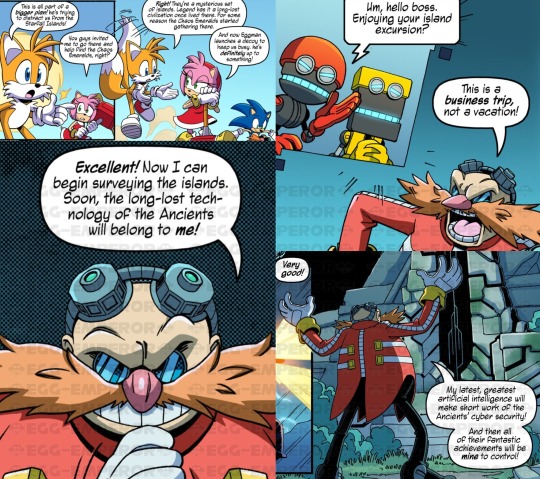
While his initial discovery wasn't revealed, he learned about the islands where an ancient civilization possessed advanced technology and it started attracting the emeralds. So he goes on a trip there, looks around and sets stuff up as we see traces of his presence left behind with ships on each one and Death Egg robot on Chaos Island where he was farming geothermal energy from the volcano.
He came across the Cyber Space structure as a piece of that tech that intrigues him so he wants to override their cyber security to access and take control of it for himself, so he had Sage downloaded to the data pad thingy and uploaded her to it to do so. He was then was supposed to get tech like their soldiers and Titans under control and use them in his plans, then he could discover more of their secrets and find a way to use all of their advanced tech he finds as a tool for world domination.
Immediately upon merging Sage with Cyber Space to try to get past that security, it summons the soldiers and the Giganto is seen in the back, so there you already have potential new power for him to take control of so he was correct. If he did succeed in harnessing and utilizing it and uncovered all their secrets in his surveying of it, he could have total control of the islands, get himself new minions, and discover more about their technology with Cyber Space and all and use their power for his selfish gain.

But of course it didn't go quite as planned as it seems that Sage sensed the danger and decided to seal Eggman in Cyber Space as a protective measure, so he gets trapped in there instead.
When trapped in Cyber Space he's fascinated by how advanced it is to the point he admits it's more than what he's dabbled in before. He continues his analysis of what he sees and throughout the memos, he finds out he was right to be curious and with all the research he gathers about the capabilities of Cyber Space and begins questioning how he can use this power and knowledge to his selfish benefit. Classic Eggman 💜
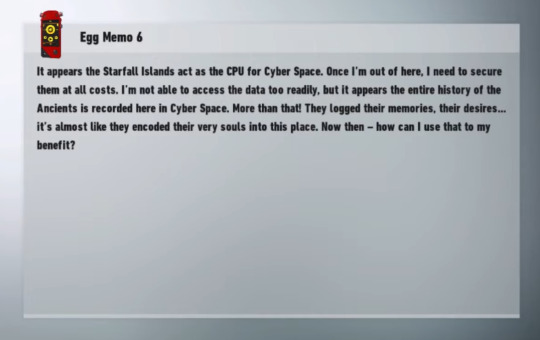
Sage was also able to somewhat control the Titans, it's just something was blocking her from taking full control but she was able to use them against Sonic and Eggman was very pleased. I'm assuming this was part of his initial plan, to take control of their power and use it against Sonic, then explore the capabilities of the rest of the tech on the islands to utilize for his bigger plan in world domination.
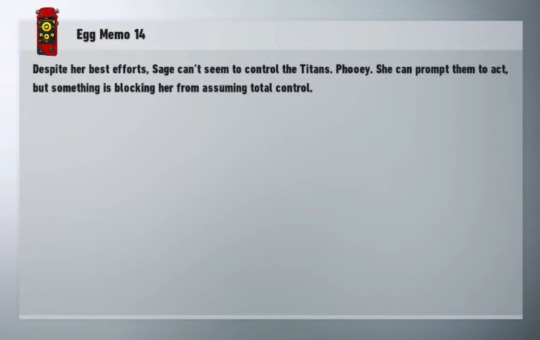
He was always planning on taking control of their creations and using them against Sonic and exploring the islands, uncovering their secrets and analyzing and learning about them like the scientist he is, then using that knowledge to figure out how he can use it in his schemes.
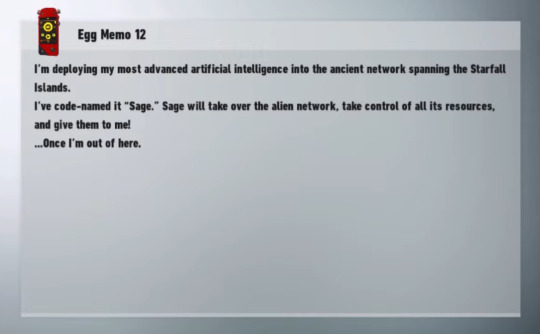
He finds out there's even more about their tech that could be useful with the capabilities of Cyber Space throughout. And he starts taking interest in The End when he learns about it being an even greater more powerful force for being able to wipe them out despite their own impressive power and creations. Which had even more potential if could've found a way to handle it, like he displayed a willingness and confidence in being able to do because of his genius and skill.

( Gotta love how he spits in the face of The Ancients' being wiped out by thinking he can do better. Sure is super sympathetic towards them huh ;D )
So had he not been trapped in Cyber Space, he could've used The Ancients' soldiers, Titans, and The End and if had utilized them successfully, I'm sure he would've had a lot of power that could help him take over the world with some plan. He clearly believes they could've done so themselves, to him it's just a question of why they didn't go ahead beyond a few "piddly" islands because of course he'd do so in a heartbeat.
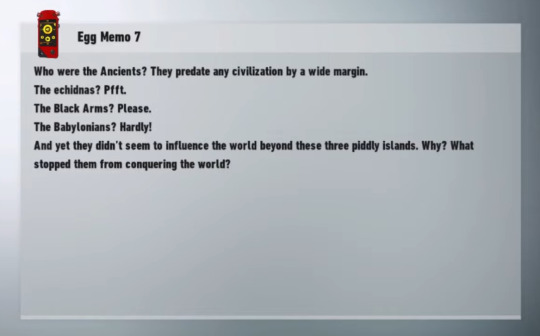
It's funny because it's also another example of how he's incapable of considering that they might not have that same greed and desire for world domination like him, he can't fathom it lol
So he already knew enough to be aware that they possessed power that he could use in his plans, so he went there to check it out and take control of their tech. Then he was going to find out what else he could do to use their tech to his advantage to achieve world domination. While a lot of this unfortunately fell apart, he still spends his time uncovering more and analyzing everything he finds out while trapped inside Cyber Space too, as we learn about in the memos.
It really shows how during the entire main game and even in the update with the island conversations, he was thinking about what he could do with their power. People saying he's morally gray in this game confuse me because of his obvious villainy and desire to scheme with the only things stopping him being trapped in Cyber Space and then in danger of The End. The intent and desire is still there from beginning to end!
And the potential was there too. Eggman had a reason to be interested in The Ancients' secrets and I would've loved to see him actually put all this knowledge to use. It feels like they teased it waaay too much to never have him actually do anything with everything he learned... so I wonder if there's a chance he'll actually do so in the future?
------------------------------------
"I saw the relationship he and Sage had as uwu and sappy. I can't visualise Eggman as a father. I certainly saw him act paternal towards Sage. It's not to my liking haha. I preferred the original ending where he had to fight for his personal victory and bring Sage back online."
I don't think the game did too bad of a job at showing what the real true dynamic of Eggman and Sage really is, ever since I paid closer attention in my second playthrough. I regret letting fandom influence how I thought and felt during my first because it ruined my first experience and made me believe things that weren't true. But now I love it because it's way different to fanon!
The most important thing to consider is the entire basis of Eggman's side of the dynamic and the specific reasons he comes to value and praise her at all, all said in his own words in the memos:

What kind of normal good wholesome caring parent brags that their child would be "loyal" and "perfectly effective"? Exactly. Those aren't things selfless, good hearted, good intentioned, genuinely caring parents expect of their child and that's the point. Eggman is already fucked up for that alone. Then to hammer it home, BOOM there it is:

The reason he recognizes, praises, and values these things in Sage as much as he does besides all the ways he benefits from them- is that he can take pride in being the one that made it all possible as she's a reflection of his genius- praising her is praising himself as her creator. And this is why Flynn said it was unsettling and that he warmed up to her for all the wrong reasons.
It's important to remember and consider this when analyzing absolutely every interaction between the two in this story.
In the prequel comic we see he specifically built Sage to protect him and he wishes aloud for a creation that will just once make him proud:

Upon hearing this, it may have prompted Sage to try extra hard to please him on top of her programming. And he was already calling her his "latest and greatest" like he does all his creations lol. So she also may have felt the need to try extra hard to live up to that high standard and expectation too.
Anyway, whether that's Sage's intention or if she's going purely by her stated programming, she does live up to fulfilling her programmed function and Eggman's wishes for a creation that will fill him with pride. She's loyal, efficient, and protects him multiple times throughout main story and Final Horizon.
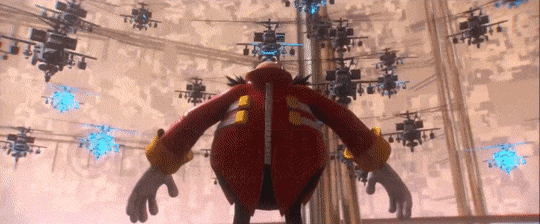

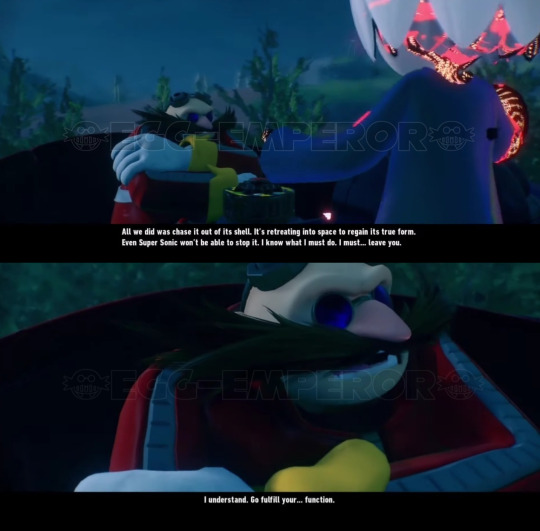
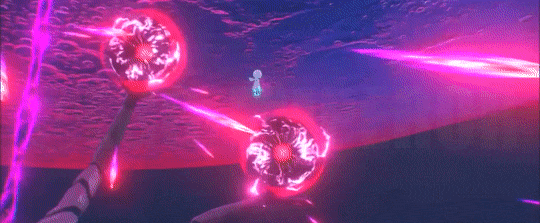
Eggman takes note of her efficiency and her being crucial in his survival in the memos.
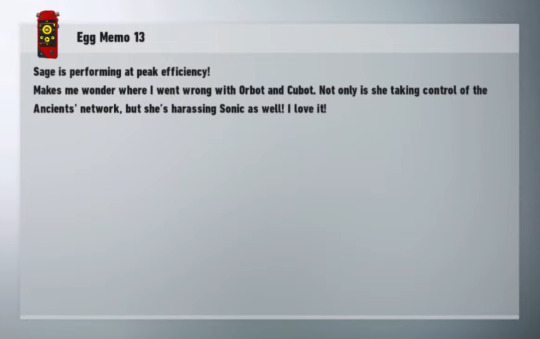

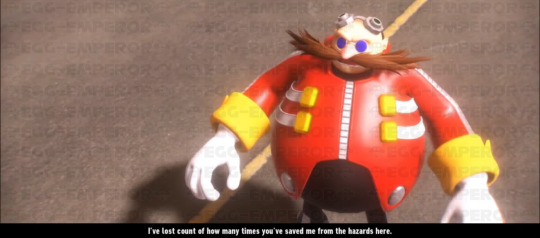
She shows true loyalty, efficiency in serving and protecting him as created, and prioritizes his safety and desires. She talks about saving him and the world for him to rule specifically, which he smiles smugly at like "finally somebody here understands it's all about me >:D"
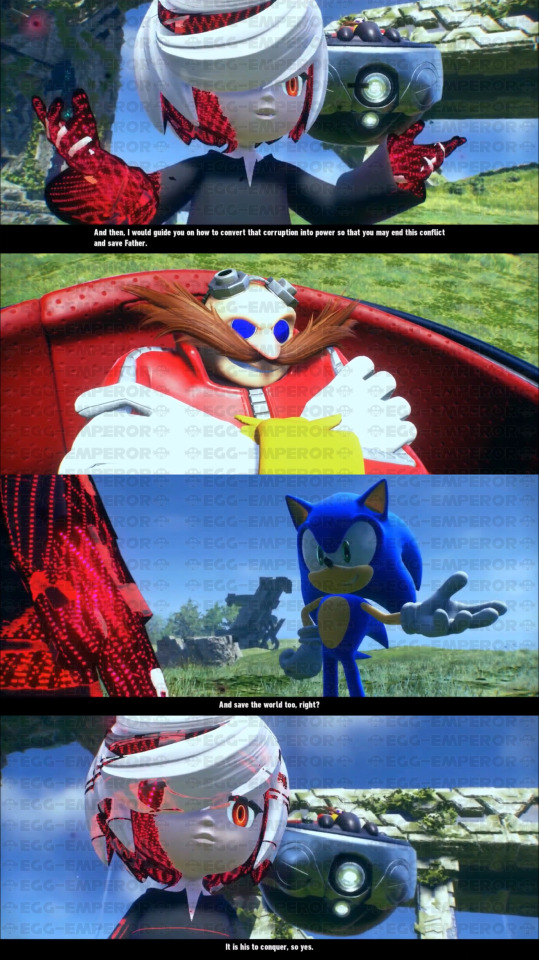
All the times he praises her highly throughout the entire game are for doing exactly as she was created and asked to do, or surpassing those expectations in pleasant ways. But then every time she does something he doesn't want her to, even in cases where his best interests are still in mind, he snaps at her for it not being exactly what he wants: (Click through for better view/open in new tab on desktop, I don't wanna make the post even longer)



Also there's also him suddenly switching to being appalled, jealous, and pissed at her just for admiring Sonic
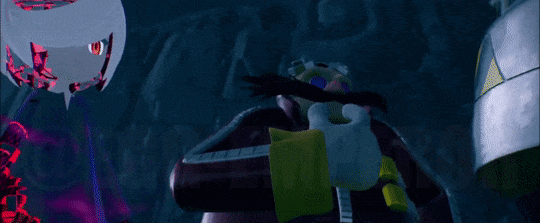
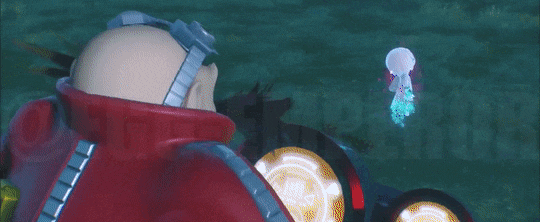
This all shows how conditional it is. He'll snap and yell at her and thump the Egg Mobile when she doesn't do what he wants in the exact way he wants one second, and praises her highly when she does the next. It's really represented best by these scenes:
youtube
First he was yelling at her for daring to suggest something he doesn't want to do, smashing his fist against the Egg Mobile in anger, and flying off. Then he was in danger of the G.U.N helicopters, she jumped in and saved him, and then he immediately switched to praising her highly and saying he was proud of her. What makes this especially significant is that you can get the second scene to play immediately after the other, if you trigger them right with the unlocking of the emeralds. Literally changes like the weather between her doing something he hates to something he wants.
I also want to bring up the flashback montage:
youtube
It shows Eggman doesn't actually do anything selflessly nice. All he does praise her for what she was created to do and she just applied love that she learned from watching Sonic and friends to those initiatives of loyalty and protection she was programmed with, the way Eggman praised her for fulfilling them, and to any likeness to family like him as her creator and Orbot and Cubot as his too, the idea of having a home, etc.
Eggman's side really is shown to be shallow, self-centered, and with his own interests and benefits in mind all along, while Sage's is more professional at first but becomes much deeper and more meaningful over time, as she witnesses what it means to be a family born of love from Sonic and co interacting. She looks to Eggman as her creator for that dynamic and applies the feelings of love she learned from them to it, even though their master creator and servant creation dynamic is much different to that. She doesn't have that but wishes she did.
Sage also clearly has doubts about him caring for her when she has to ask Sonic if he really thinks Eggman does, and it shows in her songs as she questions whether he'll be mad at her, or if she's asking for too much just to be with him, as I talked about here. This also shows that Eggman hasn't given her enough to convince her and we can really see that in the scenes. Even Sonic mumbles that Eggman "cares" for her "in his own way" because even he knows he isn't capable of loving and caring about people in the traditional conventional expected way.
They played some moments for the cuteness factor as they knew it'd appeal to a wider audience and it sure did but that part has no appeal to me. I instead like how the unsettling undertones are still there and make it interesting to analyze. And with the specific ways he praised her in the memos and the specific circumstances in mind, it makes sense as they're always the reasons that Eggman's side of the dynamic is built on.
It makes sense for Eggman not to trash her, he said she was crucial to his survival. Sure she pissed him off but so do Orbot and Cubot all the time and he keeps them around because ultimately they're useful and do their jobs (plus I also think he enjoys getting to boss them around and discipline them harshly as he does because it gives him a sense of power and control over others). And so does Sage, but with genuine enthusiasm, loyalty, and much more efficiency, and has his best interests in mind and a genuine desire to protect him. So why would he get rid of her and then not want to bring her back after her sacrifice? That would make no sense.
And it makes sense for him to praise her and be proud of her too. It's just like him being proud of Gamma. In fact, the way the scene of him yelling at her comes right before the one where he's saved and praises her highly and says he's proud of her, is a parallel to this scene where he was yelling at all the E Series calling them all dummies but then immediately changing his tune when he saw Gamma and saying he's proud of him for doing exactly what he wanted. I did a whole comparison here.
And it makes sense for him to take pride in her as an impressive life like creation, which he finds superior to organic natural life for it, and the ways he can benefit from her loyalty and efficiency. He can also take pride in her for being her creator/father, as she's a reflection of his genius and scientific skill and is useful to him. And by calling himself her father, it's also appealing to her desires for a familial bond which will also give her even more enthusiasm to serve him.
Eggman doesn't do any of this in ways that don't suit his character. He's valuing, praising her, and acting paternal on these conditions specifically, which is the only way it can work with his narcissism, ego, and selfishness intact. It's great that they didn't change him and instead found a way to further develop and solidify his already existing traits, by showing how a father daughter dynamic can work with these things in mind. It serves an an example rather than an exception to them, and this is what a lot of people are missing.
youtube
I also like The Final Horizon's ending as Eggman isn't the overly physically affectionate gushing and throwing arms around people type, it doesn't suit his demeanor and behavior and I'm glad to see that hasn't been suddenly forced with Sage. This isn't over the top and uncomfortable OOC like fanon.
It's a subtle and small gesture, extending his arm with hand out to her but looking away and forward. He's quiet, solemn, and reserved. His demeanor and body language is important. He takes a breath that seems like a "sigh well, here goes" kind of way then mumbles it, not much, just small words of praise towards her doing the very things he created and praised her for before- doing what he wants her to and serving her purpose as his protector like she protected him in the fight, and calling her his daughter also has the same effect in encouraging her and he knows it, as well as how it's appealing to him for his pride as he said in the memo.
It's very important to acknowledge he's not shy at all, that's the last word to describe him. He has the highest self esteem, self love, and confidence and it's all genuine. It's just that hyper affectionate super warm and mushy gushy-ness, be it through feelings, words, or actions isn't his thing. The most he's ever going to hype someone up close to it is in a performative manipulative way to urge them to continue doing what pleases him, and he forces it in some cases more than others, you get varying degrees.
But I like how it's on the more subtle side here a lot because it's even more telling of his true character. When he's acting like this it aligns with that reasoning again but with a new look at his style of showing it in a physical subtle manner, with his behavior being similar to the scene where she saved him in Cyber Space and said he was proud of her for it- only it was only through words then. We've now seen how he can show this verbally and physically and I like it a lot, it's the only way this can work and they did it.
I truly believe he doesn't feel the typical conventional idea of "love" for anyone but himself because he is the biggest egotist and narcissist in all of existence and is extremely selfish and people seem to be forgetting what that entails for his behavior and personality feelings, and mindset with his self absorption and low empathy. There are no sudden exceptions to this, Sage is literally just another perfect example of it, nothing has changed with him.
Also, think about the terms of which he's praising her in all of their "cutest" moments together:
Eggman is delighted that Sage has succeeded in getting Sonic's ass beat and hearing the battle reports. She's proving herself to be very useful and efficient, so he decides to take full advantage of that by properly giving her control of the Eggnet which is a huge promotion. So he uses it to butter her up to make it all the more inviting.
(again click/open in new tab for full view)

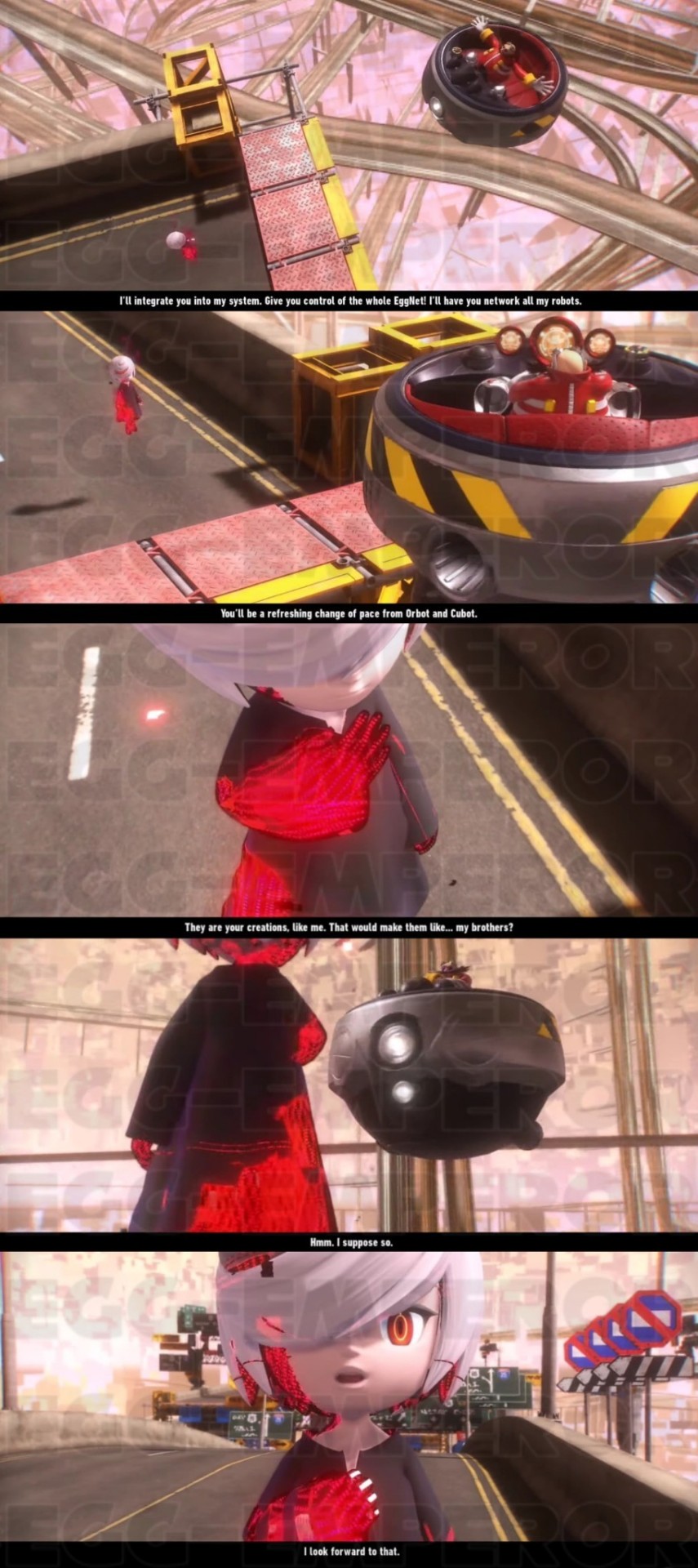
She is indeed a good change of pace from Orbot and Cubot as they're often less efficient and don't have the same enthusiasm. Sage brings everything they do but better in appealing to Eggman's interests and serving him well. And at first he takes a dig at them as he hates them immensely without an ounce of fondness but when Sage displays interest in them as being like family, he decides to play along with it and it pleases her, which is also going to make it even more inviting.
But when he first praises her most highly to her face beyond the offhand mumbling of her actions being "commendable" by saying he's proud of her, it's right after he was saved by her from the G.U.N helicopters. Then in The Final Horizon ending where he says she did good and held her hand, it's because he's saying she did a good job in protecting him from the line of fire in the final boss, helping him in destroying The End, and saving the world for him to conquer. Same goes for the original ending for the latter half, for him to revive her and say "that's my girl"
She's done exactly as asked, and he's praising her for it because it genuinely is a job well done and is exactly what he wanted and him reacting with praise encourages that. It's always because he got something out of it. It's not selfless, it's not sweet for the sake of it because he's just feeling sweet and fatherly and kind-hearted. There's always a reason in it where he has benefitted from it. It can be considered emotionally manipulative for that and very conditional too. She goes to great lengths with her actions and he rewards her with mere words- except for when it comes to her biggest accomplishment in The Final Horizon, he takes it a bit further. And what does he offer then? Just a small simple hand hold, while he looks away, seeming quiet and reserved. But it's enough for Sage and it works. It keeps her loyal and loving, he'll need to encourage it to keep her useful and enthusiastic in it.
These are all the specific reasons he praises and warms up to her, also for how calling himself her father is another way to take pride in her as her genius creator, as he said in the Egg Memos. It's all for selfish, self serving, self praising reasons. I like that a lot, it's very in character that way and how it's possible for such a dynamic to exist with his narcissism. Sage is the one giving things to him, protecting him, serving him, and showing loyalty, support, and respect for his desires while Eggman just takes. She does exactly what he wants as she’s created for and is willing and enthusiastic unlike a lot of creations of his. Eggman still hasn’t done shit for Sage, except praise her when she does what he wants but then becomes grumpy and snaps at her every time she does something he doesn’t.
So that's why, while I don't care for the cutesy way they're framed, I can see why Eggman would act that way to appeal to her desire for the family dynamic and encourage her to stay loyal and efficient. So now when it comes to the dynamic, I realized that I shouldn't just write off the entire concept as OOC. The question doesn't lie in "would this situation make sense for Eggman to do at all?", instead it's in "does this have in character reasons and basis for this to happen?" and in my opinion, it absolutely does, so it works.
------------------------
"Why was Eggman laughing at Sonic being corrupted? I assumed he personally wants to finish Sonic off. I think of Sonic 2 8 bit in Underground Zone where he saves Sonic to finish him off."
He does really want to be the one personally finish Sonic off. XD He does say this in the English version and in the Japanese version he says he wishes he could've been the one who bury him.
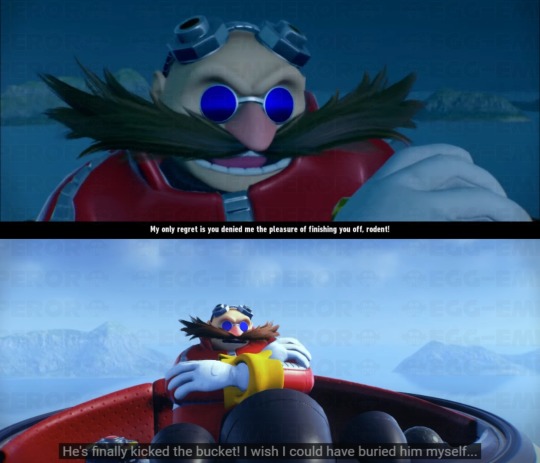
I absolutely love this scene because it really emphasizes that he does hate Sonic as he says, despite any respect he also has and any credit he gives where it's due for him being a formidable adversary. And it's the funniest moment in the game hehe 💕
I think he'll be happy about Sonic dying in any way, as long as it's not being stolen from him from someone else like the Deadly Six for example, so he saved him at Lava Mountain so he could destroy him with his Eggrobo instead. In the Sonic 2 8 bit, I imagine it's because him simply falling into lava also would've been an unsatisfying demise.
In cases where he wasn't the one to directly finish him off, if he still has some hand in it, he can accept it. This doesn't apply when just almost falling into lava like Sonic 2 8 bit or when lackeys of his almost succeed in killing him when they're no longer on his side, like the Zeti breaking the bridge and Sonic almost falling into the lava, so he saved him both times so he could try to kill him himself after.
But in this game, since he helped kick off everything, he's partially responsible for the corruption and can at least settle for that. While he celebrates his supposed demise, he voices that his only regret is that he couldn't finish him off with his own hands for the ultimate satisfaction. Still, it's good to have him out of the way either way, a victory is a victory.
Exactly when and how he wants him to die tends to change a lot though, it's like it depends on his mood lol. Like how sometimes he will very clearly try to kill him during battles as he threatens his life and yells at him to die, how he tried to shoot the capsule out into space, and how he even wants creations or lackeys to actually try to kill him. I guess as long as it's by his orders he can settle for that but again, I think he'd be slightly disappointed that he couldn't do it by his own hands after the fact.
It's kind of like how we know that Eggman would prefer to show him his completed empire before "banishing" him (definitely meant killing) in Forces, which is why he actually kept him alive and imprisoned for six months. Yet he'll always very clearly be out for blood during battles and want him dead there and then. So I feel it depends on how desperate he's feeling to get rid of him in the moment and maybe in the case of Frontiers, for at least one good thing to come out of it. But ultimately, he'll always celebrate his demise if he has some hand in it at all and gets to finally succeed in his goal!
----------------
I love Frontiers Eggman so much. 🥰💜 I love his characterization and what he did actually get to do and I'm really glad I gave him another chance after my initial disappointment. The only things I'd change are a couple of English lines because they didn't make sense or would've been more in character rephrased but in most of those cases JP fixed it- and I'd give him more action, though the update improved on it a bit and gave him a chance to go up against the boss. But I really enjoy the new directions they took him in as new interesting ways to further explore and solidify his already existing character. It made it a lot of fun for me to analyze too!
#dr eggman#eggman#dr. eggman#dr robotnik#sonic frontiers#sonic frontiers the final horizon#sonic frontiers spoilers#sonic frontiers the final horizon spoilers#eggem tag#my post#analysis#eggdad
55 notes
·
View notes
Note
Now that the shining “digital humanities future” envisaged in the 2000s and early 2010s is now (probably) over, what do you think were the effects on the discipline of English Literature of trying to reduce everything to “graphs, maps, and trees,” visualisations, data sets, and pattern matching across corpora? Is there even a there there anymore?
I don't know. Did they ever find anything new, anything truly paradigm-shattering, anything we didn't understand before, anything we really need to know about anything that matters? I'm not talking about the strictly historical-sociological work, the how-many-English-novels-were-imported-into-Meiji-era-Japan or how-many-Bibles-were-printed-in-colonial-America or how-many-books-did-the-precursor-to-the-National-Library-of-Moldova-contain-in-1889, which is fine as far as it goes, but does belong to history and sociology rather than to literary criticism, though it may of course inform literary criticism. As far as anything claiming to help us with the hermeneutics, though: did anything come of it? Did they ever answer Elif Batuman's objection from 2005—
In 2001, I enrolled in a seminar taught by Moretti on this subject, entitled “Lost Bestsellers of Victorian Britain.” The idea was to identify the formal devices that might have been responsible for the initial success and subsequent failure of these books. It was a great seminar, although not one distinguished by its humanness, or by the quality of the reading. Coelebs in Search of a Wife, The Mysteries of London, The Woman Who Did: these proved to be the kind of mirthless and dismal productions that made you want to take your copy of the Princesse de Clèves and go hide in the Rhine. There was, however, one exception: Edward Bulwer-Lytton’s Pelham, or Adventures of a Gentleman, from the lost genre of the “silver fork novel.”
“On entering Paris,” Pelham relates, “I had resolved to set up ‘a character’: for I was always of an ambitious nature. . . . After various cogitations as to the particular one I should assume, I thought nothing appeared more likely to be obnoxious to men, and therefore pleasing to women, than an egregious coxcomb.” A young man goes to Paris determined to be “an egregious coxcomb”—now that’s a premise with some life to it.
One day I mentioned Pelham in self-defense to my advisor in the Slavic department, who was forever making fun of me for taking this class on Lost Victorian Bestsellers. “There’s this one book,” I said. “It’s really good.”
To my surprise, my advisor knew all about it. “Oh, well, Pelham,” she said. “Sure. Pushkin loved Pelham.”
As it turns out, Pushkin’s love for Pelham actually resulted in his writing one and a half chapters of a novel called The Russian Pelham—and incorporating certain features of Lytton’s “egregious coxcomb” into Eugene Onegin, an antihero who gets up at dawn, takes an ice-water bath, and spends the rest of the morning practicing his pool shots. Pelham was, in a manner of speaking, big in Japan; it wasn’t lost at all, at least not to Pushkinists. This discovery made me reconsider the theoretical project of reading the 30,000 lost Victorian novels. After all, it had taken all my willpower to get through just six of them—and then, the only one I liked turned out to be one that I might have encountered anyway, through Pushkin—i.e., through the canon.
—or Nan Z. Da's critique of 2019—
Not only has this branch of the digital humanities generated bad literary criticism, but it tends to lack quantitative rigor. Its findings are either banal or, if interesting, not statistically robust. The problem appears to be structural. In order to produce nuanced and sophisticated literary criticism, CLS must interpret statistical analysis against its true purpose; conversely, to stay true to the capacities of quantitative analysis, practitioners of CLS must treat literary data in vastly reductive ways, ignoring everything we know about interpretation, culture, and history. Literary objects are too few, and too complex, to respond interestingly to computational interpretation — not mathematically complex, but complex with respect to meaning, which is in turn activated by the quality of thought, experience, and writing that attends it.
—in a way that would convince a layperson, autodidact, reader-to-save-one's-soul?
When I used to teach an intro-to-the-English-major course, I would start with J. Hillis Miller's On Literature as a theoretically informed but less cynical alternative to Eagleton's intolerably smirking Literary Theory, which was popular with other instructors of the same course. Miller historicizes literature qua imaginative writing as beginning in part not only with print culture, Protestant individualism, the rise of the nation-state, the rise of the middle class, etc. but also its institutionalization in the modern research university. Divided as it is between Wissenschaft and Bildung, roughly science and humanities, the university does designate a "scientific" element to literary studies (philology, textual criticism, stylistics, the history of the book), but the broader point of such studies was always Bildung, acculturation, the training of the citizen. The ideological basis of this training, and the desiderated citizen supposed to emerge from it, has altered over time, and with it the concept of "the best that has been thought and said" assigned to effect said citizen's acculturation. But if we lose this telos then we lose the rationale for literary study in the first place. The reduction of literature in the normative sense—the best that has been thought and said, for all the socially contested definitions of "best"—to the whole body of written fictions, and the reduction of this body to a system of Darwinian combat accessible in its pattern only to computational analysis, as if the results of such notional combat were themselves quantitative and not qualitative in nature, as if one could do a value-free analysis of novels in the same way one can do a value-free analysis of butterflies, is to cede the authority of literary studies, which can only be premised on the aesthetic charisma of its object, to the social and finally to the natural sciences, and to an outdated mechanistic 19th-century idea of the natural sciences at that. No, as Batuman points out, the value of the canon, revise it how we will, and there would be no point in revising it if it did not matter to individual and collective Bildung, remains the only satisfying warrant for the continuation of academic literary study. A science-envying reductionism, like a baptism guest who tactlessly proposes that the infant is only a bundle of meat and bone, only destroys the occasion.
4 notes
·
View notes
Text
re ship ranking stats visualisation:
I have finished making diagrams for the overall ships/characters/fandoms (that appear in the 2013-2023 ao3 data sets) data (not rankings/individual years yet, nor extra data I'll add later)!
do y'all wanna see a post about those ones already or prefer to wait until I'm done with all of them (minus extension ones)?
(either way they're available on my github repo if you just wanna look at em for yourself without further explanation)
#ship stats#coding#I'll also eventually make a video about this whole project but with how slowly matriarchy is going and other stuff#I dunno how many months away that is going to end up being#either way I'll probably end up doing multiple posts about it cause there are a BUNCHa diagrams
2 notes
·
View notes
Text
As charts proliferated, so did their sophistication. Today, newspapers such as The New York Times employ sizeable teams of data visualisation experts. Many of the data graphics they create are interactive visualisations that allow readers to explore multiple facets of complex data sets and observe patterns in the relationships among multiple variables. Well-designed data graphics provide readers with deeper and more nuanced perspectives, while promoting the use of quantitative information in understanding the world and making decisions. But there is a downside. Our educational system has not caught up. Readers may have little training in how to interpret data graphics. A recent Pew Research Center study found that only about half of Americans surveyed could correctly interpret a simple scatter plot. In particular, individuals without a college degree were substantially less likely to be able to draw correct conclusions from the graph. This is a problem in a world where data graphics are commonplace. Another problem is that while data visualisations may appear to be objective, the designer has a great deal of control over the message a graphic conveys. Even using accurate data, a designer can manipulate how those data make us feel. She can create the illusion of a correlation where none exists, or make a small difference between groups look big. Again, our educational system lags behind. Few people are taught how to spot these manipulations, or even taught to appreciate the power a designer has to shape the story that the data tell. We may be taught how to spot logical fallacies and how to verify claims from questionable sources. But we are rarely taught anything about the ways in which data graphics can be designed to mislead us.
Carl T. Bergstrom & Jevin D. West, Calling Bullshit: The Art of Scepticism in a Data-Driven World
5 notes
·
View notes
Text
Why Learn Tableau? Here are 5 powerful reasons to get started with this industry-leading tool

1. Industry-Leading Visualization: Transform raw data into stunning visuals!
2. High Demand in Data Analytics: Tableau skills are highly valued in today’s job market.
3. Actionable Insights in Minutes: Make data-driven decisions faster.
4. User-Friendly Interface: Easy to learn, even for beginners.
5. Boost Your Career: Stand out in data roles and advance your career! Want to take your skills to the next level?
Join our 1-day Tableau Bootcamp on 2nd November (Online)!
#tableau#Learn tableau#Tableau Bootcamp#data analytics#data visualization#software#big data#dataviz#technology#cavillion#cavillion learning#data visualisation#tableau dashboard#tableau software#salesforce#data#tableau community#Tableau Developer#business analytics#businessintelligence
0 notes
Text
cause im a big old loser i made a visualisation for the chuang asia rankings, ill keep updating it as we get new rankings!
2 notes
·
View notes
Text
Weekend Top Ten #614
Top Ten Scenes of People Using Computers in Movies
This week is one of those lists that I’ve had bubbling away for quite a while. Initially it was just going to be “scenes of people typing” but then I realised that most of them were funny because it was a visual thing that didn’t really translate very well into me writing them out into a list. So it has evolved into what you see before you.
I think before we begin there are two very big and obvious “people on computers” movies that aren’t here: Wargames and Hackers. I’m pretty sure I’ve seen both of them but so long ago now I don’t really remember. But I’m always up for cheesy computer scenes, as this list ably demonstrates.
So what do I think makes a good “someone’s using a computer” scene? Well, essentially, I think it has to be really, really daft. That’s what most of these have in common; they just don’t look at all like somebody really using a for-real computer. Usually it’s an actor who you feel has never even been in the same room as a keyboard jabbering away at the keys whilst talking gobbledegook whilst some kind of pseudo-magical thing entirely unrelated to the computer takes place at the same time. Done right, these scenes are gold dust; hilarity of the highest order. Sometimes you sense the filmmakers are in on the joke. Sometimes not.
One thing that I was pretty keen on here, though, was that this was people using computers in a more-or-less recognisable way. So, for instance, I’ve avoided something like the Stellar Cartography scene in Star Trek: Generations as, whilst Picard and Data are technically using a computer, to all intents and purposes it’s two people sat in a planetarium. Similarly, Tony Stark and Bruce Banner create Ultron in Age of Ultron, but it basically amounts to a holographic lightshow. Very reluctantly, I also vetoed Harrison Ford’s photo analysis in Blade Runner; I want to see people typing, y’know? So whilst very few of these are “realistic”, at least they’re – more or less – recognisable.
Right, it’s already late, so let’s type “run” and get on with this.
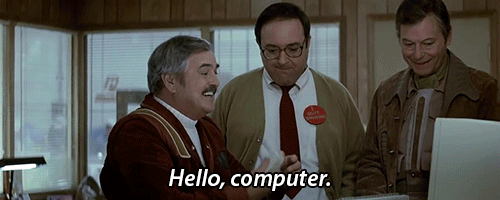
Hugh Jackman in Swordfish (2001): “The best crackers can do this in sixty minutes. I need someone who can do it in sixty seconds.” So speaks John Travolta as a weirdo bell-end crypto-terrorist (or something) who forces ex-con computer hacker Jackman to diddle with a laptop whist receiving, er, downstairs assistance from a lady. It’s so shitting stupid. It’s one of the stupidest things I’ve ever seen and I’ve seen almost every Michael Bay film. And, I dunno, “crackers”? Do people say “crackers”? I mean, it is crackers, so there’s that. It’s so camp, so silly, so unrealistic, they’ve got to have been in on the joke? Surely?
Jonathan Pryce in Tomorrow Never Dies (1997): what Pryce is actually doing here – creating newspaper front pages – isn’t really that ridiculous. It’s just how he types. He’s got a tiny laptop and he seems to just randomly jerk his fingers around in the direction of the keyboard. It’s the most fascinating typing in human history.
Whoopi Goldberg in Jumpin’ Jack Flash (1986): we’re staying Pryce-adjacent but it’s Whoopi who’s the star here, in this beautiful celebration of 1980s VD-Usage. Big monitors, chunky keyboards, low-res fonts: it’s lovely. It’s also, interestingly, quite a good way of visualising somebody in a chatroom, as Goldberg inexplicably ends up in convo with spy-in-hiding Pryce, their relationship playing out entirely via cursor but always seeming dynamic and interesting with some good direction and a lovely, vibrant performance from Goldberg herself.
James Doohan in Star Trek IV: The Voyage Home (1986): Scotty and Bones inventing “transparent aluminium” in 1986 is very funny in and of itself, but it’s Doohan’s attempts to use a 20th Century computer that elevates this scene. Dismissing as primitive the inability to just spit instructions into thin air, he picks up the mouse to use as a microphone. Trust me, it’s funny.
Ariana Richards in Jurassic Park (1993): “A Unix system! I know this!” Yes, teenage computer hacker Lex saves the day and gets Jurassic Park back online without Dennis Nedry, thanks to her ability to very slowly navigate a painful first-person interface by holding a mouse incredibly strangely. Look, it was the nineties; everyone just assumed some sort of bad VR was how we were going to interact with computers in the future.
Jeff Goldblum in Independence Day (1996): this is one of the most famous (infamous?) scenes of computer misuse in a movie, and the only reason it’s so low is because the actual use of the computer isn’t that bad, it’s more the implications of it. Because, yes, Goldblum hacks into an advanced alien mothership using (if I recall) a mid-nineties MacBook, and is able to transmit a virus. He gives them a cold! Don’t ask any questions.
Vanessa Redgrave in Mission: Impossible (1996): the most famous scene of computer use in this movie is undoubtedly the bit where Tom dangles off the ceiling at Langly and barely drops a bead of sweat. But I prefer the moment later on, when Redgrave’s Max is trying to upload the NOC list to the internet, via a mobile connection, on a train, in 1996. Wow! What’s kinda great is, in a semi-fantastical spy-adventure-action series (that, moments later, has Cruise jumping off a crashing helicopter onto a train inside a tunnel), the actual use of the computer here is relatively realistic, shockingly so back in the day when accurate depictions of operating systems were few and far between. Even Redgrave’s frustration seems believable.
Richard Pryor in Superman III (1983): another superb, sublime bit of silicone silliness, the only reason this is so low is because I really don’t like this movie. Or, rather, I don’t like any of the stuff with the villains – the film is almost saved by Clark’s new relationship with Lana Lang, and the big where he goes all Tyler Durden in a junkyard. But! Pryor is an unemployed guy who’s never used a computer who – the first time he uses one – discovers to his shock that he’s a savant who can program and hack anything. His hands move with a will of their own. He literally does not know how he knows what to do. It’s still less stupid than Swordfish.
Harrison Ford in Clear and Present Danger (1994): this is one of the sorta-realistic ones, as Ford’s Jack Ryan is trying to get evidence of Henry Czerny’s naughtiness, looking at his files on the computer but hoping his snooping is undiscovered. The OS looks real, it feels genuine, and the most tense moment comes when Ford realises he’s out of printer paper. I’m not even kidding, this draws true stress from whether Ford’s secretary popped to Staples that morning.
Tom Hanks and Meg Ryan in You’ve Got Mail (1998): outside of the relatively nice quirk that big corporate dude Hanks uses an IBM PC laptop and flowery arty Ryan uses a MacBook, this is another one that has to represent email and chatroom dialogue visually. And it does an okay job, even if it is rather mawkish and schmaltzy. But more or less it does look like they’re using computers, even if they verbalise and visualise their email writing more than most.
I’ve just realised I’ve got two 1986 films and then two 1996 films back-to-back. What can I say? We didn’t know how to use computers back then.
3 notes
·
View notes
Text

A recent project of mine has been a little RPG game in Unity (more to come on this,) and one of the big parts of developing a game with lots of content like an RPG is dealing with absolutely humungous amounts of ✨Data✨
One such source of spicy, spicy data is Dialogue - I'm a big fan of games like Stardew and Harvest Moon, where talking to NPCs reveals their character, their personality, etc. It's immersion breaking when an NPC start spurting repetitive dialogue, so I've set up a system where there's dialogue that's event driven, conditional and very varied.
But, with so much dialogue, there's a lot to get bogged down by, and I want a nice lil interface I can use to write my dialogue, without writing it directly into a json file.
So - Dialogue Crafter is a little standalone app I'm working on using PyQt in Python, which lets me load up my dialogue data and edit it in (what will eventually be,) a node based format - I can connect dialogue in chains, add choices and branching dialogue, and organise dialogues by character, by season, by purpose, by relationship level with the talker, the list goes on.
Even in it's rough and gnarly state (note the papyrus header) it's been a big help for parsing dialogue and visualising all that data.
A challenge - take a shot every time this post says the word "dialogue"
5 notes
·
View notes
Text
Future of data science?
Exciting developments await the future of data science as it evolves. Data scientists can expect to see greater integration of artificial intelligence (AI) and machine learning, facilitated by automation and AutoML, which will make data analysis more accessible. Proficiency in big data and real-time analytics will be crucial as the volume and complexity of data continue to expand. Additionally, ethical considerations such as privacy protection, bias detection, and responsible AI implementation will remain important focal points. Furthermore, data science will involve increased interdisciplinary collaboration that bridges technical expertise with domain knowledge and ethics.
Explainable AI will be necessary for the development of trust and compliance, while edge and IoT analytics will cater for the increased demand of IoT devices. In this way, data visualisation and storytelling skills will still be vital. Data scientists will need to adapt as organisations shift to hybrid and multi-cloud environments. This field will require continuous learning for success. The next quantum leap for data science with quantum computing. Customization and personalization will also define data science; this will deliver specific solutions for particular business needs. In the data-driven era, it’s the data scientists that will excel.
If you are considering preparing for this promising future, Edure provides a wide variety of comprehensive data science courses designed for students of all skill levels. Edure has a comprehensive curriculum that includes introductory courses in basic data science concepts, tools and techniques for beginners and advanced programs targeted for experienced professionals. These courses will give you the knowledge and the skills that will enable you to succeed in the data-driven world of tomorrow. Therefore, whether a beginner or an expert desiring to remain up to date in data science, Edure courses are valuable for launching into or deepening one’s involvement in this promising domain.
For more information contact as
Edure | Learn to Earn
Aristo Junction, Thampanoor,
Thiruvananthapuram, Kerala , 695001
+91 9746211123 +91 9746711123
2 notes
·
View notes